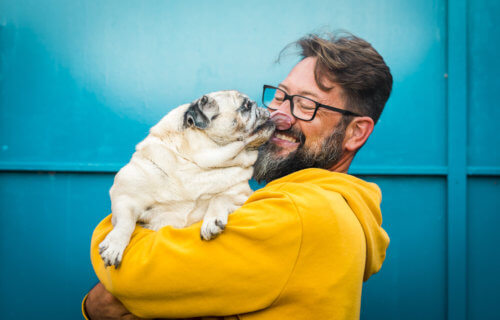DURHAM, N.C. — Dogs really are “man’s best friend” and “get” humans in a way other animals simply can’t relate to. Sorry “Game of Thrones” fans, a new study finds even the dog’s closest relatives — wolf pups — don’t gel with people the same way.
Researchers from Duke University say 14,000 years of domestication plays a big part in this. In fact, man’s best friend has actually evolved to understand human gestures and look to humans for help in a way that no other animals do.
Study authors, who compared wolf pups raised by humans to dogs who had barely any contact with people, discovered that dogs still outperform their wolf counterparts in tests of their understanding and co-operation with humans. The team behind the research adds their results show dogs instinctively understand people.
“This study really solidifies the evidence that the social genius of dogs is a product of domestication,” says Dr. Brian Hare, a professor of evolutionary anthropology, in a university release.
It’s this ability, Hare says, which makes dogs such great service animals.
“It is something they are really born prepared to do,” the researcher adds.
Much like human infants, the team finds puppies intuitively understand what a human is doing when they point at something. Wolf puppies, on the other hand, did not pick up on this.
“We think it indicates a really important element of social cognition, which is that others are trying to help you,” Hare explains.
“Dogs are born with this innate ability to understand that we’re communicating with them and we’re trying to cooperate with them,” doctoral student Hannah Salomons adds.
Dogs know people can help them, no matter what
In one test, researchers hid a treat in one of two bowls, then gave each dog or wolf puppy a clue to help them find the food. In some trials, the researchers pointed and gazed in the direction of the hidden food. For the others, they placed a small wooden block beside the right spot — a gesture the puppies had never seen before — to show them where they hid the treat.
The results reveal that, even with no specific training, dog puppies as young as eight weeks-old still understand where to go. Researchers add dogs were also twice as likely to get it right in comparison to wolf puppies around the same age who spent more time with people.
More than half (17 out of 31) dog puppies consistently went to the right bowl while none out of the 26 human-reared wolf pups did better than a random guess. Control trials showed the puppies weren’t simply sniffing out the food. Even more impressively, many of the dog puppies got it right on their first try. Absolutely no training necessary, the dogs just got what humans were doing. Despite the results, Salomons says this isn’t about which species is “smarter.”
It’s not about intelligence, it’s about evolution
Dog puppies and wolf puppies proved equally adept in tests of other cognitive abilities, such as memory and motor impulse control, which involved making a detour around transparent obstacles to get food. It was only when it came to the puppies’ people-reading skills that the differences became clear. “There’s lots of different ways to be smart,” Salomons explains. “Animals evolve cognition in a way that will help them succeed in whatever environment they’re living in.”
Other tests show that dog puppies are also 30 times more likely than wolf pups to approach a stranger.
“With the dog puppies we worked with, if you walk into their enclosure they gather around and want to climb on you and lick your face, whereas most of the wolf puppies run to the corner and hide,” the student researcher continues.
When presented with food inside a sealed container, the wolf pups generally tried to solve the problem on their own. Conversely, the dog puppies spent more time turning to people for help, looking them in the eye as if to say “I’m stuck, can you fix this?”
Proving that the history between humans and dogs goes way back in time
Dr. Hare believes the research offers some of the strongest evidence yet of what’s known as the “domestication hypothesis.” Somewhere between 12,000 and 40,000 years ago, long before dogs learned to fetch, they shared an ancestor with modern wolves. How these feared predators transformed into man’s best friend is still a bit of a mystery.
One theory is that, when humans and wolves first met, only the friendliest wolves would have been tolerated and gotten close enough to scavenge on early human leftovers instead of running away. Whereas the shyer, meaner wolves might go hungry, the friendlier ones would survive and pass on the genes that made them less fearful or aggressive toward humans.
The theory is that this continued generation after generation, until the wolf’s descendants became masters at gauging the intentions of people they interact with by deciphering their gestures and social cues.
The findings appear in the journal Current Biology.
SWNS writer William Janes contributed to this report.
